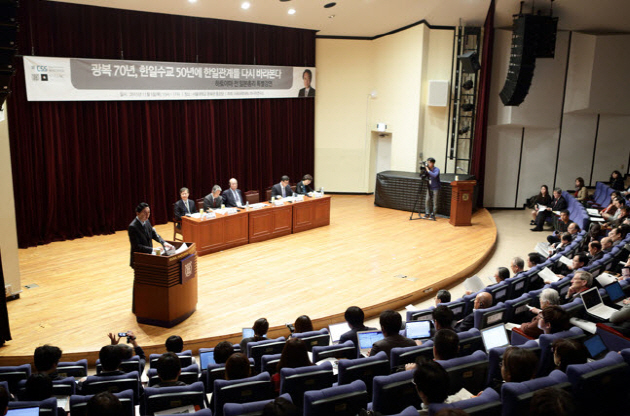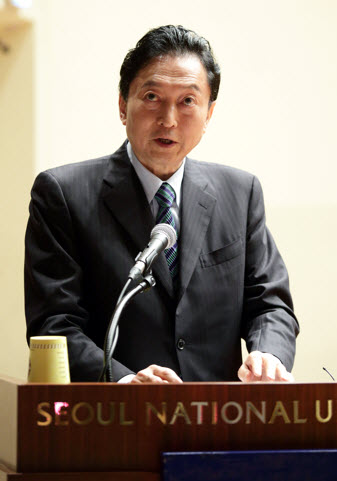
Yuki Hatoyama is giving a lecture at the University Cultural Center
On November 5th, former Japanese Prime Minister Yukio Hatoyama (2009~2010), who had expressed a wish to converse with young Korean intellectuals, delivered a lecture at Seoul National University. It marked the 70th anniversary of Korean independence from Japan, and was the first time a former or incumbent Japanese prime minister spoke at SNU.
An engineering graduate of the University of Tokyo, Hatoyama earned a PhD at Stanford University and started his political career in the Liberal Democratic Party but later became one of the founding members of the Democratic Party of Japan, and subsequently became the first Prime Minister in 2009.
Hatoyama visited Korea earlier in August for a ceremony marking the 70th anniversary of the end of World War 2. During this visit, he toured the Seodaemun Prison, where Korean independence fighters had been jailed and tortured by Japanese officials. At one point, in front of the memorial stone, Hatoyama knelt in respect, and offered a prayer for freedom fighters who were killed by Japanese police during the Japanese occupation.
In his lecture, Hatoyama discussed the bilateral summit between South Korean President Park Geun-hye and Japanese Prime Minister Abe Shinzo on November 2, “It is unfortunate that the issue of comfort women and historical disputes regarding Japan and Korea have yet to be resolved. However, it is a relief that Korea and Japan have held a summit to attempt to improve relations.” He also commented on the strained Korea-Japan relations over the past decades, by expressing concern over the uncompromising nationalistic stance of the incumbent Prime Minister Shinzo Abe. Hatoyama explained that the conservative stance of Japan and the Lost 20 Years, the years from 1995 to 2007 which marked an economic recession, caused the decline of Japanese national confidence, and a subsequent lack of magnanimity.

Former Japanese Prime Minister Hatoyama
The former Japanese Prime Minister also talked about the controversial issue of Korean comfort women, girls and women forced into sexual slavery by the Japanese Imperial Army before and during World War 2, “The true problem with comfort women isn’t whether they were forced or consenting, but is its very existence in an abusive, and unethical system.” He was critical of the Japanese government’s attempts to cloud the matter, “Just 20 years ago, the Japanese Emperor himself apologized for the damage and suffering caused by Japanese crimes. Through the Murayama Statement and the Kono Statement, we apologized for our mistakes… but the recent attempts to review the Kono Statement is not a pursuit of democracy and peace but the result of narrow-minded nationalism.” Hatoyama was met with massive applause as he claimed, “A Japanese patriot would be right to apologize for the wrongs of his country and move forward… We must take responsibility for our history until other countries no longer feel the need to criticize us for our actions.”
Another point discussed by Hatoyama was his concern of Prime Minister Abe’s passage of security legislation in September. These security bills revised the ground rules for military engagement, allowing Japan to commit to collective self-defense. This is a subject of heated debate as it allows Japan, for the first time since the end of World War 2, to deploy the Self-Defense Forces to assist an ally in battle overseas, even if Japan itself is not under attack. Hatoyama felt that this would lead to increased tension and an acceleration of an arms race in Asia.
Hatoyama concluded his talk by proposing the idea of an East Asian Community: an integration of Asia, similar to the current European Union, which he believed would secure peace and prosperity. To achieve this, he stressed the importance of Korea-Japan relations, and the need for Japan to truly apologize for its crimes. He concluded by quoting the words of Count Coudenhove-Kalergi, founder of the first popular movement for a united Europe, written 91 years ago, “All great historical ideas started as a utopian dream and ended with reality. Whether a particular idea remains as a utopian dream or becomes a reality depends on the number of people who believe in the ideal and their ability to act upon it.”
Written by JUN Taehoon, SNU English Editor, taehoonjun@snu.ac.kr
Reviewed by Eli Park Sorensen, SNU Professor of Liberal Studies, eps7257@snu.ac.kr

